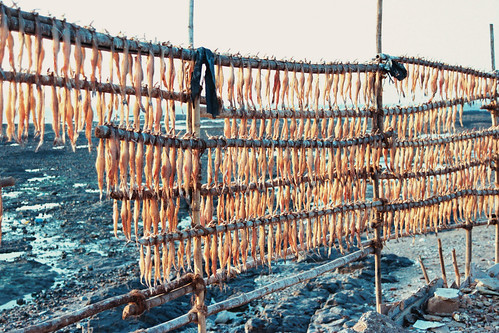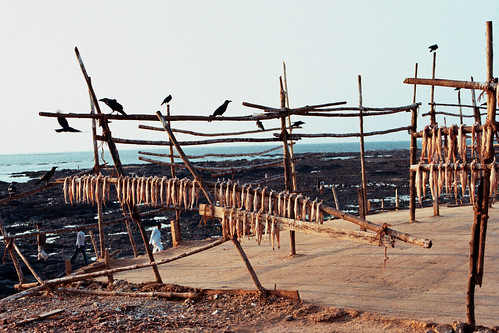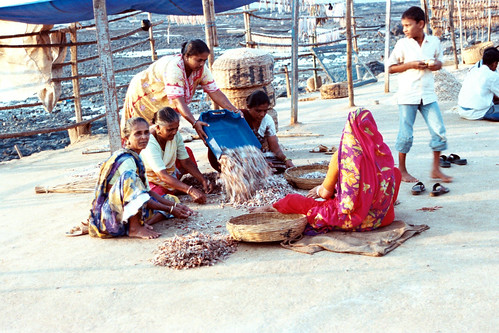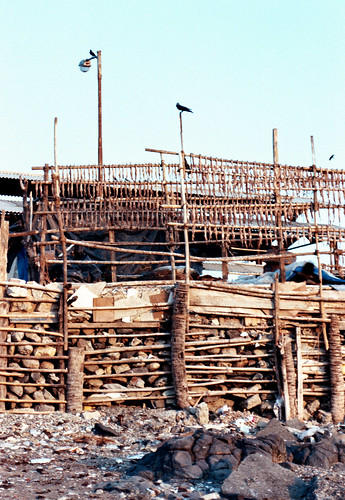We met up in Bandra and after a very leisurely and enjoyable lunch at Lemon Grass, the Carter Road promenade it was, to get drenched in the indolent, late afternoon sun. Mea culpa, I must admit. We didn't go there simply because the promenade is gorgeous. Ever since the last time I had seen the bombil, or Bombay Duck, drying at the koliwada at the northern end of Carter Road, my shutter-button-happy finger had been dying to go back.
You see, in Bombay, I've lived all my life by the sea. Well, most of all my life. Our new home is the only one I've not looked out onto endless expanse of ocean from at least one of the windows. I've grown up with the smell of bombil drying, rising up from the koliwada, offending the nostrils. Only this stench, beside the smell of burning rubber at Kalyan station at four in the morning, will get me smiling like one crazed because my city, my home, approaches.
Wondering what a koliwada is? Allow me. The original inhabitants of Bombay are the kolis, a community of deep-sea fishermen and a koliwada is their settlement along the shore. Mumbai, the official name of Bombay, originates from Mumbadevi, the patron goddess of the kolis, enshrined to this day in Dongri. A number of well-known areas also owe their names to the original koli versions. For example, Kolbhat is what we know and love as Colaba. :-)
A koliwada is usually a bustling and colourful place, replete with the sounds, smells and business of the sea. Bombay used to have six "great koliwadas" of which, none survive in their erstwhile glory. The growth and spread of urbania has pushed the kolis into increasingly smaller spaces, now seen only at places like Backbay Reclamation, Mahim, Bandra, Khar, Bassien and Madh Island. If it wasn't for a number of landmark Supreme Court rulings protecting the fishermen's rights in the 1960s, they'd have nowhere to call home.
When you first approach the Bandra koliwada, rack upon rack of drying bombil assault the nose. But once you've gotten past that, you begin to see how beautiful the red-white fish look against the flush of the retreating sun. You have to appreciate the effort going into cleaning and putting the fish out to dry because that's one fish that smells up a storm. You also had to admire the efficient, disciplined way in which the racks are set up and the various dried fish sorted for sale and export.

Note: I am firmly of the opinion that where there are fish to be had, there you will find a feast of crows. These, I believe, were waiting to swoop in for the kill once the fisherwomen had moved away. I fully accept that this may be the hypothesis of a suspicious mind.

A little further down were the aforementioned fisherwomen, cleaning out shrimp. I moved closer to capture them going about their business with a stunning economy of movement. When they noticed me, the usual questions about which newspaper/magazine I worked for and the self-conscious smiles came but their hands didn't stop - not for a second.
So there I was, composing my shot when I caught a couple of sentences in Gujarati - and nearly dropped my camera. To my utter shock, these women were not kolis but my brethren from Gujarat. Now, it's not that Gujarat doesn't have its indigenous community of fishermen but drying fish in Bandra, these ladies are a long way from "home." I switched to my broken Gujarati and we were off!
A few families from their village had apparently moved to Bombay a couple of generations ago - between 35-40 years ago - from Kuchchh. They had come to the city of dreams to realise their own. Being outsiders in a community so far removed from their own cannot have been easy and indeed, it didn't seem to be because they were quite unwilling to talk about it. And they still spoke of Gujarat as their gaam. The word is translated as village but I do believe home would be far more accurate. And yet, Bombay is still home. Strange as it is, I understand that.
After a long conversation, they told me I could take more photos if I wished. One them even posed for me! She had the loveliest smile - tired but warm as the noonday sun. Unfortunately, the light on that one didn't do her justice thus I will not post it. However, in the photo below she's the lady in the brown saree, half-obscured by the tray of cascading shrimp.

This last photo? Well, Holly and I walked down from the dying yard to the rocks on the beach - I use the word loosely, I should like you to know. I turned around to see, in the center of all the drying rack, this crow perched on a pole, the king of all he surveyed. I quite liked it. I hope you do too.

18 comments:
Nice work Extempore, Khar Danda is a brilliant place. My nose is permanentaly blocked, which goes a long way improving the experience.
I did go tide fishing with these very folk about a month back.
Great pictures and great words to go with them.
I saw these pictures over a week back on your flickr page, you lazybones! :)
This one put the smile back on my face. Especially that bit about the women being "my brethren from Gujrat" and "the dying yard".
But thanks for all the stench-packed info! Bombay through your shutter is definitely worth viewing.
Your eye for detail, ear for history and love for the place is exemplary and something I wish I could emulate...you would make one damn good travel writer if you ask me...
nice. khar danda is a great place to show someone... so's versova, only, the smells are stronger... my uncle had taken me for the first time when I was about 12. I ended up getting abused, considering I nearly fell into a fisherwoman's tokri. But then, I'm little clumsy like that.
Seems to be an interesting place. Still wondering though as to how you could bear the smell!
such a beautiful journey through your little fishy adventure. :) i love the pictures.
Awesome pics. Very well done!
And you should, somehow, get into travel-writing.
Great work extempore, think you could get this published into some mainstream magazine and make some money off it - just reward for the olfactory assault you have bravely borne :-)
Say Khar Danda and I'm immediately assaulted with a memory of one day I was going to AF(bombay) in bus no.56 - we got accosted at Khar Danda (yes literally - they stopped the bus by parking vehicles on both sides) and then attacked with water balloons by the Koliwada boys! I was lucky enough to be missed...it took us 15 mins to get out of there, and by then my senses were reeling with the fish smell...
Great report girl - I quite agree with you abt the crows and dead fish (actually any food - they used to even wait to swoop down on baby Schnapps! Needless to say he hates crows...and I'm talking too much!)
I love bombay, but didn't all this history! thanx
wow! you already knew all this? fascinating vignette of bombay. obviously because you make it so.
very nice. both the words, the photos, the imagery. :)
except 'aforementioned'!?
Oh its nice to see you back. You were missed much. Muah muah and all that jazz :D
And what a description! A long post, and I read it all at one go... I love the simplicity with which you narrated everything :)
As for the last photo, dont you think the crow sitting on the streetlamp is more supreme than the one on the pole? No?
ah be the word, write any more these ...
im stealing the first snap...pray for me.
The more I hear of it, the more I like it :)
@Akshay: Thanks! Yup, brilliant it is and I loved your photos of the tide fishing on Flickr! That was well done, it was. Thanks for dropping by!
@Isis: Hey, the photos may be a little old but the words aren't no? C'mon cut me some slack here! Thanks - :-)
@Anil: Thank you, sir. That's kindly done of you. Bombay is easy to love, Anil, and some day I look forward to introducing and your camera to Bombay. :-)
@BGFS: Thanks! Would have showed her Versova, were she coming home. She was put up in town and Bandra was midway. The next time perhaps. Thanks for dropping by!
@Srikar: It is really interesting and once you get used to it, the smell doesn't bother you much at all!
@Trans: Thank you, my dear! Am so glad you liked them - Feast of Crows is among my absolute favourites. :-)
@Pepper: Thanks, Majesty! Am trying the travel writing route - trust me!
@G: Thank you - now only if the mainstream magazine would employ me. :-)
@Geets: Man, that sounds like trauma unlimited. ;-) Sometimes home was unbearable because of the fish smell - used to drive me mad! Thanks for thy kind words, mine friend, and no you weren't talking too much. :-)
@Brood Mode: Am glad to hear that - ask anyway anytime you want to know something. :-)
@Words Worth: Yes, my love, I did know this already! Tch, tch! :-) Thanks for such kind words - coming from a writer as you, high praise indeed.
@Jedi: Thanks. What can I say - I like 'aforementioned. :-) Thanks for dropping by!
@Casa: Muah, muah to you too sweets! Am glad you liked this one - I fully agree, the other crow rules as well. :-) Am glad you saw it!
@Ubermensch: :-) be the response. Am trying to do just that - and you are most welcome to steal all. I trust you to use them well! :-)
@Cowlick: You came here and it conquered you, didn't it! Bombay is so easy to love, no? *very, very wide grin!*
Hi Ext - I've linked up to your post in part 3 of my Bombay's Diaries series linked here. Thanks.
Post a Comment